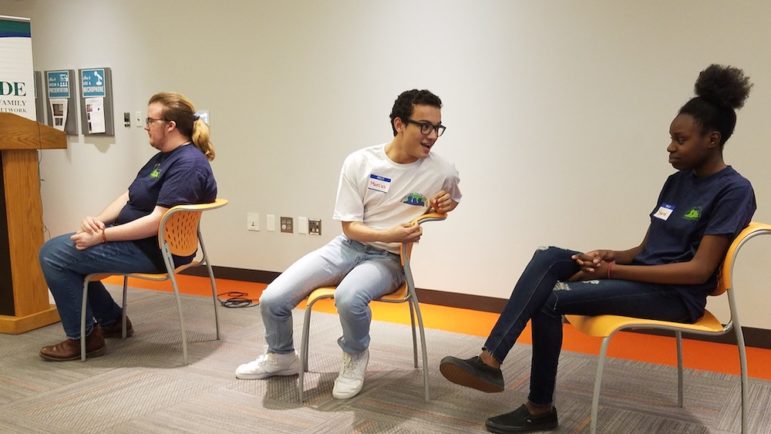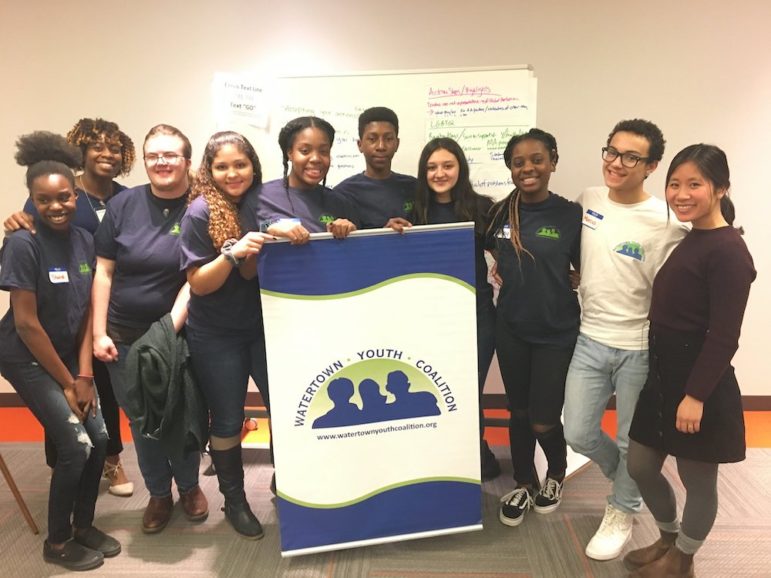
Showing that teens do care about more than video games and shopping, a group of Watertown High School students presented a Town Hall meeting about issues facing youth in Town: addiction, depression, racism, and sexual identity.
The Watertown Youth Coalition’s Youth Peer Leaders helped organize the Well-Being of Watertown Youth Town Hall meeting, held at the Watertown Free Public Library on Wednesday. It was also sponsored by the Watertown Youth Coalition.
Town Councilor Tony Palomba, who is also on the board of the Watertown Youth Coalition, applauded the teens for the work that they have done. Along with helping to organize the event, they have secured grants to study tobacco retailers in town, look at ways to reduce tobacco use, and projects on other issues.
“They are very special people. They are special because they are doers,” Palomba said. “I feel the Peer Leaders are special because they have chosen to spend their precious time and energy to benefit their classmates and encouraged them to make heathy choices.”
Dramatizing Substance Abuse
Before the discussion began, the teens presented a short play about addiction, and what it can look like for high schoolers. They created the play with the help of the Improbable Players, a Watertown-based theater troupe focused on bringing awareness about addiction and substance abuse.
The play showed a teen trying being given some pills at a friend’s party. The next day, he asked the friend if he could have more, and the friend said, “Sure. $20.” The teen had to get the money from a friend, and when she asked what it was for he made up a reason.
Each time he went back for more pills, the price went up, and he had to make up more and different excuses, until the friend refused to keep giving him money. Then he began taking valuables from his parents. Eventually he gets caught and goes to rehab.
In another scene, a teenage girl came home to find her mother almost passed out from drinking. The mother asked her daughter to go get the vodka out of the cabinet. She refuses, and the mother ultimately passes out. She goes to the hospital and is told to go to rehab.
After the play, the audience was asked what could have been done differently. People said the friend should have questioned why the boy kept on coming back for money. Another said that the parents of the boy, who made the excuse that he was going to bible study the night he went to the party, should have asked for more details.
Pressing Issues
The Watertown Youth Coalition conducts the Youth Risk Behavior Survey every other year. The latest survey was just given to Watertown High School and Middle School students, said Stephanie Sunderland, Program Coordinator at Wayside Youth & Family Support Network.
With no new results to discuss this year, the group at Wednesday’s meeting delved into a variety of issues, including substance use, sexual identity, racism, depression, and how they often collide.
“The (Youth) Peer Leaders came up with issues in the Youth Risk Behavior Survey,” Sunderland said. “They identified several topics: vaping, racial diversity in school staff, depression. They are also issues prevalent in society.”

Attendees broke up into several groups and each one discussed a topic in depth and then told the larger group about what they talked about.
The Youth Peer Leaders were asked if they have seen their peers vaping or using drugs. They said vaping is common among Watertown students, even in school. One said that they have seen students use a vape device in class and would blow the smoke under their shirt collar to hide the vapors. They even reported seeing students vaping in the bathroom at Watertown Middle School. Some said they had seen students smoking marijuana, even at school.
The group discussing the issue of vaping said more education about the dangers of vaping is important, as well as more enforcement on retailers so that underage people cannot purchase vaping items.
One group talked about how having a trusted adult to talk to about issues is important for teens to deal with their problems. Teens should believe that the person can be trusted to keep the teen’s problems confidential.
For some students, finding someone who can relate to their problems is tough, particularly racial and religious minorities, or those who do not identify as straight, sexually. A peer leader, who is African-American, said that she does not know of one teacher of her race at WHS. She added that while other teachers can empathize about what she is going through, they cannot truly understand.
One group looked at how the racial make up of the Watertown Public Schools does not reflect that of the students. While the district has made that a goal, the group wanted to find ways to emphasize to the School Administration how important the issue is to them.
The group looking at the experience of LGBTQ students in the Watertown schools said that students report that many of these students are bullied, and homophobic comments are common in Watertown’s schools. They also said that students rarely get punished for using such language. At the same time, some efforts have been made to make students of all orientations welcome, such as the rainbow flag displayed at Watertown Middle School, and gay marriage was made legal in Massachusetts before many states.
The Risk Behavior Survey found that substance use and depression is common among LGBTQ students. Students also said they don’t feel like they have an outlet to speak with a trusted person about their problems.
Students also said that mental health and mental illness are not well understood, and often the target of jokes. They said youth in Watertown facing such problems feel isolated and do not seek help because of the stigmatization. The group discussing this issue said efforts should me made to de-stigmatize mental illness by providing more education, and that more opportunities should be created to allow people suffering from the disorders to get education and employment.
Where to Get Help
Sunderland said that students facing problems who want to speak with someone have a hotline they can contact using their phones.
“Hit 741-741 and text ‘Go'” Sunderland said.
Someone will be there 24 hours a day to talk to students about their problems, Sunderland said.
Parents looking for information for how to speak to their children about difficult issues can find it on Look – Talk – Listen page of the Watertown Youth Coalition website. Access it by clicking here.
“There you will find took kits for talking with kids about a topics feel uncomfortable about talking with their kids,” Sunderland said.

Well done Youth Peer Leaders. Thank you for speaking out so clearly about important issues.